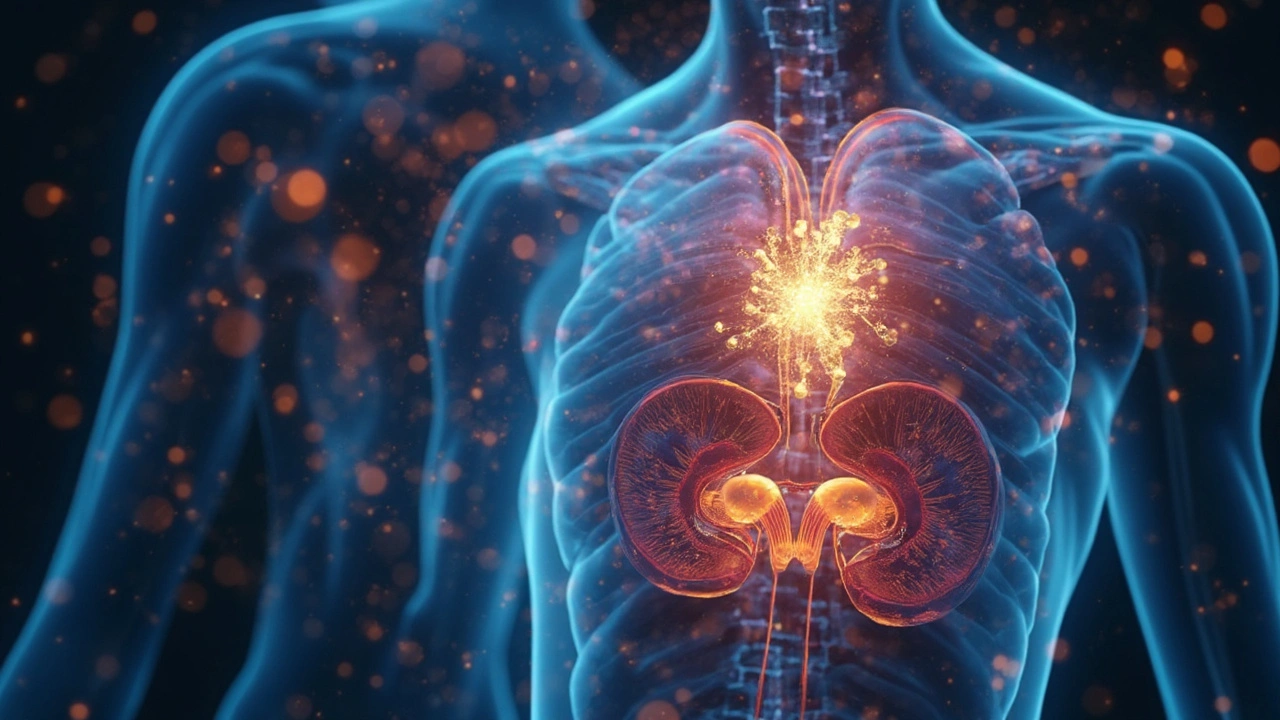Calcitriol and Adrenal Glands: How Vitamin D Affects Hormone Balance
 Jun, 23 2025
Jun, 23 2025
Picture this: sunshine streaming through your window, hitting your skin, kicking off a chemical reaction that ends up shaping your mood, stress, and even blood pressure. Sounds like science fiction? It’s just your body making vitamin D — and there’s a twist. Your adrenal glands, sitting on top of your kidneys, are right in the thick of things. These little powerhouses pump out hormones like cortisol, adrenaline, and aldosterone. But what’s wild is how calcitriol, the active form of vitamin D, steps in and tweaks their performance. You might think vitamin D only matters for bones, but think again. This stuff is involved in all kinds of hormone drama, and missing out on it can send your stress and salt balance haywire.
What Is Calcitriol and Why Does It Matter?
The science behind vitamin D is sneaky. You get it from the sun or your diet, but your body doesn’t just use it straight away. First, it gets converted in your liver to 25-hydroxyvitamin D, and then your kidneys (with a push from parathyroid hormone) flip it into calcitriol. This is the version that actually does the job — a kind of master key unlocking vitamin D’s full power. Calcitriol is technically a hormone, not just a vitamin. That means it doesn’t just build bones, it talks to cells all over your body, even your immune system and, yes, your adrenal glands.
Why does all this matter? Because getting enough calcitriol is tied to everything from mental health to blood pressure. The connection between vitamin D (via calcitriol) and your stress response is still being uncovered, but studies from the past decade keep finding the same clue: people with low vitamin D levels tend to have wilder hormone swings and sometimes even adrenal problems at their root. Calcitriol isn’t just some bystander. It’s an active participant in keeping your stress-related hormones under control.
The Adrenal Glands: Your Body's Stress Command Center
The adrenal glands look small, but don’t let their size fool you. They handle high-pressure jobs. In the outer layer (the cortex), they make cortisol (the stress hormone everyone talks about), aldosterone (which controls your salt and water balance), and a handful of sex hormones. The middle bit (the medulla) spits out adrenaline and noradrenaline, ready to help you fight or flee in an emergency. When your body’s under threat — a looming work deadline, your phone ringing off the hook — the adrenals are your first responders.
But here’s the catch: they don’t work in isolation. Adrenal function is orchestrated by feedback from your brain (the pituitary and hypothalamus), your kidneys, and... you guessed it, hormones like calcitriol. If you’re low on calcitriol, your whole adrenal system can get thrown off. In 2022, a British Medical Journal article noted that vitamin D deficiency is strongly linked with adrenal insufficiency (when your glands can’t make enough hormones), and not just in rare diseases like Addison’s. Everyday stress, low mood, and gut issues can sometimes point right back to this system and a lack of calcitriol in the mix.
How Calcitriol Influences Adrenal Hormones
This is where things get interesting. Calcitriol can stick to vitamin D receptors in the cells of the adrenal cortex, flipping genetic “switches” that turn hormone production up or down. Most research has focused on its effect on cortisol and aldosterone. When you’ve got healthy calcitriol levels, your adrenals tend to play nice — they balance out your blood pressure, stress response, and water control. But if your levels drop, everything can go a bit haywire. You might feel tired, dizzy, or anxious, and you can actually see changes in blood tests.
One lab experiment at the University of Cambridge found that when human adrenal cells were exposed to calcitriol, their production of cortisol dropped by almost 30%, while their sensitivity to ACTH (a hormone from the brain that triggers cortisol release) also changed. So, more calcitriol can act as a kind of brake, preventing cortisol from running wild—good news if you’re stressed or struggling with mood swings.
Calcitriol also tweaks aldosterone, which controls how much salt and water you keep or lose. Too little calcitriol? Aldosterone can skyrocket, leading to high blood pressure and swelling. Too much? You can get salt loss, low blood pressure, or tiredness. It’s all about the right balance.
| Hormone | Normal Function | Effect of Calcitriol |
|---|---|---|
| Cortisol | Manages stress, reduces inflammation | Calcitriol can lower excess production |
| Aldosterone | Regulates salt & water balance | Keeps levels in check to avoid extremes |
But let’s not forget adrenaline production. While less direct, there’s some early evidence calcitriol helps buffer rapid swings by stabilizing the outer cortex and tuning the immune system, making sudden adrenal overreactions less likely. In people with autoimmune adrenal conditions, like Addison’s, supplementing vitamin D (under medical advice) can sometimes help ease fatigue and stabilize blood pressure swings.
"The role of vitamin D in adrenal hormone regulation is likely underestimated. Calcitriol is emerging as a critical factor in stress-related health and salt-water balance." — Prof. Ben Whittaker, Endocrinology Review, 2023

Tips for Keeping Calcitriol and Adrenal Health on Track
So, if you want your adrenal glands (and mood, blood pressure, and stress levels) running smoothly, how do you make sure calcitriol is on your side? Start with the basics: get enough sunlight, especially from late spring to early autumn. In the UK, midday sun for 10-20 minutes several times a week can work wonders, as long as you’re careful about skin protection. But don’t rely on sunshine alone — people in northern climates like Bristol often need more, especially during the winter.
- Eat foods rich in vitamin D, like oily fish (think salmon and mackerel), eggs, and fortified cereals. Mushrooms exposed to sunlight can help if you’re veggie or vegan.
- Talk to your GP about getting a 25(OH)D blood test if you’re tired often, catching every cold, or dealing with blood pressure swings. They can check if you need more vitamin D.
- Don’t go wild with supplements unless you know you’re low. Too much vitamin D can mess with calcium and actually strain your kidneys and heart.
- If you have a condition affecting your adrenals (like Addison’s, Cushing’s, or unexplained fatigue), ask your doctor about vitamin D and calcitriol levels. Managing your diet and getting enough rest are even more crucial.
- Stay hydrated, keep stress in check (yoga or brisk walks really help), and eat regularly to give your adrenals a steady supply of energy. Crash diets or long fasts can make things worse if your adrenals are already under pressure.
Don’t underestimate the basics. Regular sleep, enough protein, and time outside all help keep your hormone feedback loops running properly. If you’re a numbers person, experts in the UK suggest aiming for blood vitamin D levels of 50-125 nmol/L (nanomoles per litre), which supports both bone and adrenal health.
Modern Life and Hidden Adrenal Risks
Daily life in Bristol isn’t exactly stress-free. From endless rain to work deadlines and the cost-of-living squeeze, modern life pushes adrenal glands to their limits. Here’s where calcitriol steps in as a silent ally. Plenty of folks develop subtle adrenal fatigue—not a medical diagnosis, but that “wired but tired” feeling, low energy, or constant cravings for salty snacks. Often, this is paired with low vitamin D, especially in the winter months when the sun all but disappears in the UK. And while true Addison’s disease is rare (about 15 per 100,000 people), milder adrenal “underperformance” is actually pretty common — and often gets missed or blamed on just being busy.
Did you know? Research from the University of Manchester published in January 2024 found that nearly 35% of UK adults tested in December were vitamin D deficient — and those in the lowest group were twice as likely to report high levels of fatigue. Other stats from the NHS show vitamin D deficiency costs the health system millions every year, mainly due to bone health, but also through indirect issues like mood changes and fatigue. No one likes to talk about their glands, but it’s time we did.
For people who work night shifts, avoid the sun, or have darker skin (which makes vitamin D production slower), the risk is even higher. Add in stress — like moving house, job losses, or big exams — and the risks stack up fast. Kids and teenagers are at risk too, often glued to their screens indoors. The classic symptoms are subtle: tiredness, mood dips, muscle aches, salt cravings, light-headedness when standing up. These can sneak up on almost anyone, so keeping tabs on vitamin D is a smart move, especially if your job, lifestyle, or genetics put you at risk.
What the Future Holds for Calcitriol and Adrenal Science
The more scientists study vitamin D, the more mystery there seems to be. New research is zooming in on how calcitriol affects not only the adrenals but the whole endocrine (hormone) system. Already, hospital clinics are starting to check vitamin D in people with unexplained adrenal symptoms. There’s also some buzz about whether vitamin D supplements could help reduce the risk or severity of certain autoimmune adrenal diseases — early trial results from Scandinavia hint at possible benefits, though we’re still waiting for clear guidelines.
One thing’s for sure: vitamin D isn’t going away as a health topic any time soon. Whether you’re a stressed-out city worker, a student pulling all-nighters, or just someone keen to protect your long-term health, paying attention to calcitriol is a powerful way to look after your adrenals. The link between the sun, your skin, and those small but mighty adrenal glands is a cool reminder that body systems are deeply connected — and that even something as everyday as getting outdoors can have a major impact on your hormones.
Does this mean you should ditch all your worries and just chase the sunlight? Not exactly, but it does mean taking control of your vitamin D status is one of the easier wins for your health. Next time you’re hitting that afternoon low or feel your stress levels creeping up, remember: it might not just be work, it could be your adrenals calling out for a bit more sunshine-powered help. So don’t ignore them. Your body — and maybe your mood — will thank you.

Abhay Chitnis
June 29, 2025 AT 12:18Robert Spiece
June 29, 2025 AT 12:42Vivian Quinones
July 1, 2025 AT 05:10Eric Pelletier
July 2, 2025 AT 11:26Also, hydration and circadian rhythm matter more than you think. Your adrenals aren't magic. They're biochemistry.
Marshall Pope
July 2, 2025 AT 21:47Nonie Rebollido
July 4, 2025 AT 20:28Agha Nugraha
July 5, 2025 AT 14:50